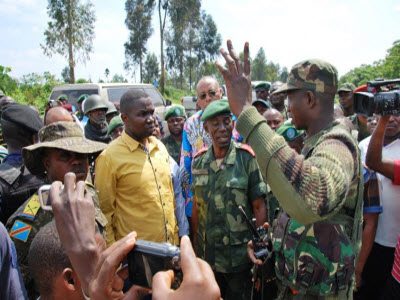
The spokesman of the Congolese Armed Forces in the province, Col. Olivier Hamuli, announced Saturday afternoon that the army, known as FARDC, had taken control of the town.
Col. Hamuli said that some rebels were still trying to oppose a “little resistance" on the hill of Helu, on the border with Rwanda. He called on the M23 rebels to disarm.
Visiting Kibumba on Saturday, North Kivu province Governor Julien Paluku said he was pleased to see that “our armed forces are behaving very well.”
He said that the M23 rebels tried to open another front towards Kahunga. “Fortunately, our armed forces are now advancing,” he added.
Governor Paluku said that DR Congo’s army command has insisted that all areas still under the control of the rebels must return into the hands of the regular forces.
He said he hoped that Kiwanja and Rutshuru will also pass under the control of the Congolese army so that the road between Goma and Rutshuru can be reopened.
“That way we can begin to observe life gradually return, we can begin to see a return of the internally displaced people to their areas of origin as I have just observed in Kanyaruchinya,” he said.
The fighting between the FARDC and the M23 resumed early Friday morning in Kibumba. These are the most violent clashes since last August. The fighting is taking place while talks between the Congolese government and the rebels in Kampala, Uganda, have been suspended.
In a joint statement issued on Saturday, the Special Envoy of the Secretary General of the United Nations in the Great Lakes Region, Mary Robinson, and the Special Representative of the UN Secretary General in DR Congo, Martin Kobler, called on all parties to observe maximum restraint and to resume negotiations.
“The negotiating parties have an incentive to immediately find an agreement on the outstanding issues in Kampala,” they said.
Bertrand Bisimwa, the political leader of the M23, said that “the government must understand that only the talks in Kampala will bring peace.”
In a message to the AFP news agency on Friday, Congolese government spokesman Lambert Mende rejected any suggestion of warmongering: “Everyone knows who sabotaged the talks [...] it is the M23, which is serving a foreign country that relies on the destabilization of the DRC to lay hands on its resources.”
In their discussions, the two sides have particularly disagreed on the issue of amnesty for rebels and their reintegration into the army. The Congolese government rejects granting amnesty to the perpetrators of war crimes and crimes against humanity but says it is ready to treat each application on a case-by-case basis.
Related articles
- • DRC and Rwanda Sign Declaration of Principles for Peace in Eastern Congo (April 25, 2025)
- • European Union Sanctions Rwanda and M23 Officials over Congo Conflict (March 17, 2025)
- • Canada and Germany Impose Sanctions on Rwanda for Supporting M23 Rebels (March 4, 2025)
- • UK Suspends Financial Aid to Rwanda Over M23 Rebellion (February 25, 2025)
- • European Union Suspends Defence Consultations with Rwanda (February 24, 2025)
- • Tshisekedi Announces Government of National Unity and Calls for Unity Against M23 Rebels (February 23, 2025)
- • UN Security Council Calls on Rwanda to Stop Supporting M23 Rebels in DR Congo (February 22, 2025)
- • US Sanctions Rwanda's Minister James Kabarebe for Central Role in DR Congo Conflict (February 20, 2025)
- • Rwanda-Backed M23 Rebels Summarily Executed Children in Bukavu, UN Reports (February 19, 2025)
- • DR Congo Citizens Head to Polls to Elect President, Members of Parliament (December 20, 2023)
- • 'Deadly environment' plus 'political and social' obstacles hinder Ebola fight, Security Council hears (July 24, 2019)
- • Ebola outbreak declared an international Public Health Emergency (July 17, 2019)
- • Constitutional Court Declares Tshisekedi Winner of Presidential Election (January 19, 2019)
- • At least 30 dead after massacres in Ituri (March 2, 2018)
- • No elections in DR Congo in December without electronic voting machines: INEC (February 13, 2018)
- • DRC Seeks Arrest of Presidential Candidate Moise Katumbi (May 19, 2016)
- • Peacekeepers, Congo Army to Resume Joint Fight Against Rwandan Rebels (January 28, 2016)
- • Political tensions 'running high' in DR Congo ahead of 2016 elections (October 7, 2015)
- • UN Report Blames Ugandan Islamists for 237 Killings in DR Congo (May 14, 2015)
- • DRC Army Putting Pressure on FDLR (April 1, 2015)
- • Denis Mukwege Wins Sakharov Prize 2014 (October 21, 2014)
- • Violence in North Kivu Kills 21, Mostly Women, Children (October 18, 2014)
- • ICC confirms war crimes charges against Bosco Ntaganda (June 10, 2014)
- • Kerry Calls on Kabila to Honor Constitution (May 4, 2014)
- • Kerry in DR Congo for Security Talks (May 3, 2014)
- • Death toll in Lake Albert boat accident rises to 251 (March 27, 2014)
- • U.S. sending more personnel to Uganda to hunt LRA leader Joseph Kony (March 24, 2014)
- • Death toll in Lake Albert boat accident rises to 108 people (March 24, 2014)
- • DR Congo Takes Chairmanship of COMESA at Summit in Kinshasa (February 26, 2014)
- • Bosco Ntaganda Attacked Civilians on Ethnic Grounds, ICC Prosecutor Says (February 10, 2014)







